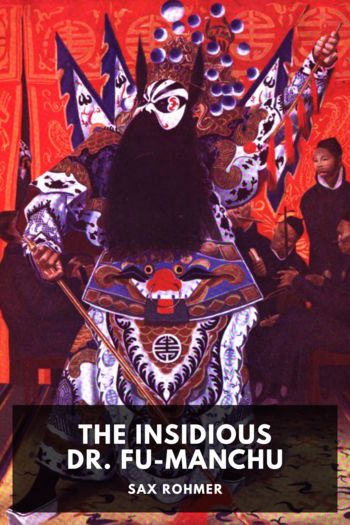Brood of the Witch-Queen Sax Rohmer (read 50 shades of grey TXT) 📖

- Author: Sax Rohmer
Book online «Brood of the Witch-Queen Sax Rohmer (read 50 shades of grey TXT) 📖». Author Sax Rohmer
“There’s some tale about Kitchener—”
“By Kitchener, Ashby says; but I don’t believe it.”
“Well—Ferrara lighted a lamp, an elaborate silver thing, and I found myself in a kind of nightmare museum. There was an unwrapped mummy there, the mummy of a woman—I can’t possibly describe it. He had pictures, too—photographs. I shan’t try to tell you what they represented. I’m not thin-skinned; but there are some subjects that no man anxious to avoid Bedlam would willingly investigate. On the table by the lamp stood a number of objects such as I had never seen in my life before, evidently of great age. He swept them into a cupboard before I had time to look long. Then he went off to get a bath towel, slippers, and so forth. As he passed the fire he threw something in. A hissing tongue of flame leapt up—and died down again.”
“What did he throw in?”
“I am not absolutely certain; so I won’t say what I think it was, at the moment. Then he began to help me shed my saturated flannels, and he set a kettle on the fire, and so forth. You know the personal charm of the man? But there was an unpleasant sense of something—what shall I say?—sinister. Ferrara’s ivory face was more pale than usual, and he conveyed the idea that he was chewed up—exhausted. Beads of perspiration were on his forehead.”
“Heat of his rooms?”
“No,” said Cairn shortly. “It wasn’t that. I had a rub down and borrowed some slacks. Ferrara brewed grog and pretended to make me welcome. Now I come to something which I can’t forget; it may be a mere coincidence, but—. He has a number of photographs in his rooms, good ones, which he has taken himself. I’m not speaking now of the monstrosities, the outrages; I mean views, and girls—particularly girls. Well, standing on a queer little easel right under the lamp was a fine picture of Apollo, the swan, lord of the backwater.”
Sime stared dully through the smoke haze.
“It gave me a sort of shock,” continued Cairn. “It made me think, harder than ever, of the thing he had thrown in the fire. Then, in his photographic zenana, was a picture of a girl whom I am almost sure was the one I had met at the bottom of the stair. Another was of Myra Duquesne.”
“His cousin?”
“Yes. I felt like tearing it from the wall. In fact, the moment I saw it, I stood up to go. I wanted to run to my rooms and strip the man’s clothes off my back! It was a struggle to be civil any longer. Sime, if you had seen that swan die—”
Sime walked over to the window.
“I have a glimmering of your monstrous suspicions,” he said slowly. “The last man to be kicked out of an English varsity for this sort of thing, so far as I know, was Dr. Dee of St. John’s, Cambridge, and that’s going back to the sixteenth century.”
“I know; it’s utterly preposterous, of course. But I had to confide in somebody. I’ll shift off now, Sime.”
Sime nodded, staring from the open window. As Cairn was about to close the outer door:
“Cairn,” cried Sime, “since you are now a man of letters and leisure, you might drop in and borrow Wilson’s brains for me.”
“All right,” shouted Cairn.
Down in the quadrangle he stood for a moment, reflecting; then, acting upon a sudden resolution, he strode over towards the gate and ascended Ferrara’s stair.
For some time he knocked at the door in vain, but he persisted in his clamouring, arousing the ancient echoes. Finally, the door was opened.
Antony Ferrara faced him. He wore a silver-grey dressing gown, trimmed with white swansdown, above which his ivory throat rose statuesque. The almond-shaped eyes, black as night, gleamed strangely beneath the low, smooth brow. The lank black hair appeared lustreless by comparison. His lips were very red. In his whole appearance there was something repellently effeminate.
“Can I come in?” demanded Cairn abruptly.
“Is it—something important?” Ferrara’s voice was husky but not unmusical.
“Why, are you busy?”
“Well—er—” Ferrara smiled oddly.
“Oh, a visitor?” snapped Cairn.
“Not at all.”
“Accounts for your delay in opening,” said Cairn, and turned on his heel. “Mistook me for the proctor, in person, I suppose. Good night.”
Ferrara made no reply. But, although he never once glanced back, Cairn knew that Ferrara, leaning over the rail, above, was looking after him; it was as though elemental heat were beating down upon his head.
II The Phantom HandsA week later Robert Cairn quitted Oxford to take up the newspaper appointment offered to him in London. It may have been due to some mysterious design of a hidden providence that Sime phoned him early in the week about an unusual case in one of the hospitals.
“Walton is junior house-surgeon there,” he said, “and he can arrange for you to see the case. She (the patient) undoubtedly died from some rare nervous affection. I have a theory,” etc.; the conversation became technical.
Cairn went to the hospital, and by courtesy of Walton, whom he had known at Oxford, was permitted to view the body.
“The symptoms which Sime has got to hear about,” explained the surgeon, raising the sheet from the dead woman’s face, “are—”
He broke off. Cairn had suddenly exhibited a ghastly pallor; he clutched at Walton for support.
“My God!”
Cairn, still holding on to the other, stooped over the discoloured face. It had been a pretty face when warm life had tinted its curves; now it was congested—awful; two heavy discolorations showed, one on either side of the region of the larynx.
“What on earth is wrong with you?” demanded Walton.
“I thought,” gasped Cairn, “for a moment, that I knew—”
“Really! I wish you did! We can’t find out anything about her. Have a good look.”
“No,” said Cairn, mastering himself with an effort—“a chance resemblance, that’s all.” He wiped the beads of perspiration from his forehead.
“You look jolly shaky,” commented Walton. “Is she like someone you know very





Comments (0)